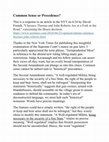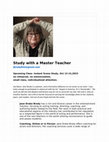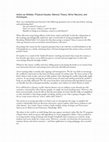Papers by Jane Drake Brody

Common Sense or Precedence, 2024
thomas-johnroberts.html Thanks to the New York Times for publishing this insightful examination o... more thomas-johnroberts.html Thanks to the New York Times for publishing this insightful examination of the Supreme Court's stance on gun laws. I particularly appreciated the term phrase, "Jurisprudential Mess" in reference to the absurd new ruling lifting many gun restrictions. Judge Kavanaugh and his fellow justices can assert their views all they want, but an overly broad interpretation of the Second Amendment can plunge us into this chaos. Common sense cannot be subservient to "historical" precedence. The Second Amendment states, "A well-regulated Militia, being necessary to the security of a free State, the right of the people to keep and bear Arms, shall not be infringed." Interpreting this statement "historically" suggests that gun owners, armed with blunderbusses, should assemble on the village green to ensure readiness to defend the community. In today's era of deconstructed language, we must halt such "historical" nonsense. Words have precise meanings.

Bloomsbury Publishing Plc Imprint previously known as Methuen Drama eBooks, 2015
The Actor’s Business Plan is a self-directed practical guide for actors graduating from formal tr... more The Actor’s Business Plan is a self-directed practical guide for actors graduating from formal training programs, as well as for those already in the business whose careers need to move ahead more successfully. Using the familiar language of acting training, the book offers a method for the achievement of dreams through a five-year life and career plan giving positive steps to develop a happy life as an actor and as a person. It assists performers to flourish using the same kind of business/career planning that is a necessary part of life for entrepreneurs and business people. This introduction to the acting industry provides essential knowledge not only for how the business actually works, but also describes what casting directors, agents, and managers do, demystifies the role of unions, discusses how much things cost, and offers advice on branding and marketing strategies. It differs from other such handbooks in that it addresses the everyday issues of life, money, and jobs that so frequently destroy an actor’s career before it is even begun. While addressing NYC and LA, the guide also gives a regional breakdown for those actors who may wish to begin careers or to settle in other cities. It is loaded with personal stories, and interviews with actors, casting directors, and agents from throughout the US. The Actor’s Business Plan is the answer to the common complaint by students that they were not taught how to negotiate the show business world while at school. It is the perfect antidote for this problem and can easily fit into a ten or a thirteen-week class syllabus. Offering support as a personal career coach, empowering the actor to take concrete steps towards their life and career dreams, The Actor’s Business Plan: A Career Guide for the Acting Life is a must-have book for actors who are determined to be a part of the professional world.
Routledge eBooks, Oct 4, 2016

Jane Drake Brody, 2023
The work we did was the deepest and fastest way for me to uncov3er my role. Not only is Jane an i... more The work we did was the deepest and fastest way for me to uncov3er my role. Not only is Jane an intuitive teacher, but a fierce learner focused on passing her knowledge down to her students, peers, and readers. Get out of your head and into the scene. Jane Drake Brody has a rich and diverse career in the entertainment industry, focusing on acting training, directing, coaching, and authoring books related to the field. Her work in both practical and educational aspects of the industry has contributed to her reputation as a respected figure in the world of acting and performance. She is one of the rare teachers in the world utilizing neuroscience to guide and assess students. Coaching, Online or in Person: Jane Drake Brody offers coaching for actors and directors. Her coaching services cover a wide range of topics, including audition preparation, script analysis, onset assistance, monologue selection and coaching, cold reading, and diagnosis of acting difficulties.
Performing Arts, The Actor's Business Plan, Oct 22, 2015
Choice Reviews Online, 2016

The Actor’s Business Plan is a self-directed practical guide for actors graduating from formal tr... more The Actor’s Business Plan is a self-directed practical guide for actors graduating from formal training programs, as well as for those already in the business whose careers need to move ahead more successfully. Using the familiar language of acting training, the book offers a method for the achievement of dreams through a five-year life and career plan giving positive steps to develop a happy life as an actor and as a person. It assists performers to flourish using the same kind of business/career planning that is a necessary part of life for entrepreneurs and business people. This introduction to the acting industry provides essential knowledge not only for how the business actually works, but also describes what casting directors, agents, and managers do, demystifies the role of unions, discusses how much things cost, and offers advice on branding and marketing strategies. It differs from other such handbooks in that it addresses the everyday issues of life, money, and jobs that s...

How could a basketball team function if the following questions were at the top of their training... more How could a basketball team function if the following questions were at the top of their training and performing lists?
Do you mind if I touch you?
Don't we need a 'violence coach' for this?
Should we bring in an Intimacy coach to avoid distress?
When did actors stop being athletes of the heart, mind, and body? Is this the culmination of the in-going, psychologically analytical, open wound style of acting promulgated by the Strasberg Method folks? Is it about the idea that acting is emotion? Does it concern the film close-up wherein actors reveal their tortured hearts with tears?
Or perhaps the reason for the required questions has to do with the overall fearfulness in the US population as a whole, stemming from a Puritan background that seems to have reared it punitive head.
Or maybe it is a result of the 'build self esteem' teaching movement that swept the country a few decades ago where every child was given a reward and not taught how to deal with overcoming obstacles through conflict.
Whatever the reason, conflict and story telling seem to be losing the battle as we retreat from true interaction between and among actors and seek self-inflicted emotion.
Actor training today is mostly solo, ingoing, and introspective. We do very little to encourage the conflictive interaction at the heart of drama outside of combat class. We leave action in the head, relate it only to plot, and never fully explore what releasing the conflict physically might uncover. In our acting training the powerful senses of touch and smell presented by another's body are not fully addressed. We shy away from these vital and powerful ingredients because we literally fear the archetypal sensuality, sexuality, and violence of which theatre is made.
If we still lived in a literary world, wherein theatre was an auditory event dressed up with costumes, witnessed by other literary people, we might not need anything more.
However, the latest neuroscientific research tells us that the perception of action whether fully accomplished or only intended is what keeps people engaged, merely to see what is going to happen.
How do we create actors who are 'actors' rather than 'feelers'?
My search as an acting specialist is to find a way to reinvigorate the stage, to equalize the creative relationship between directors and actors, and to explore what moves audiences and what doesn't. As a result, I have written a book entitled, Acting, Archetype, and Neuroscience: Superscenes for Rehearsal and Performance, Routledge, 2016.
How can we create actors of courage and inventiveness who work as a team while protecting them fr... more How can we create actors of courage and inventiveness who work as a team while protecting them from physical
interaction?
This paper is an attempt to begin a discussion concerning the training of actors for all mediums.

Heroic Journeys: Superscenes for Actors, Directors, and Teachers In an attempt to overcome the fr... more Heroic Journeys: Superscenes for Actors, Directors, and Teachers In an attempt to overcome the fragmentation of current acting pedagogy into discrete bundles of disciplines and styles, and to reclaim the inherent right of theatre to be theatrical, I have worked to mine the essentials of accepted acting theory while finding ways to access more primally based human behavior in actors. My thesis is that, like our computers, acting pedagogy has become overcrowded with complications. The focus on simple storytelling has been lost in the rush to create interesting characters with psychological complexities and fascinating physical and vocal lives. Concentration on character-creation distances actors from their authentic responses, their instincts, and their responsibility to the action of the story at its deepest levels. This psychologically-driven approach halts the actor’s creativity before he or she even begins by limiting a palette of action that should be limitless at its inception. ...
Synthesizing the pedagogy of acting with new findings in Neuroscience and archetypal understandin... more Synthesizing the pedagogy of acting with new findings in Neuroscience and archetypal understandings of human ways of learning and seeing. This book contains practical exercises for directors, actors, and teachers to use combining these three elements.
Books by Jane Drake Brody
Simply a notice of publication by Routledge via Amazon
Drafts by Jane Drake Brody
This is an attempt to explain and clarify my theory in a short paper.
Teaching Documents by Jane Drake Brody










Uploads
Papers by Jane Drake Brody
Do you mind if I touch you?
Don't we need a 'violence coach' for this?
Should we bring in an Intimacy coach to avoid distress?
When did actors stop being athletes of the heart, mind, and body? Is this the culmination of the in-going, psychologically analytical, open wound style of acting promulgated by the Strasberg Method folks? Is it about the idea that acting is emotion? Does it concern the film close-up wherein actors reveal their tortured hearts with tears?
Or perhaps the reason for the required questions has to do with the overall fearfulness in the US population as a whole, stemming from a Puritan background that seems to have reared it punitive head.
Or maybe it is a result of the 'build self esteem' teaching movement that swept the country a few decades ago where every child was given a reward and not taught how to deal with overcoming obstacles through conflict.
Whatever the reason, conflict and story telling seem to be losing the battle as we retreat from true interaction between and among actors and seek self-inflicted emotion.
Actor training today is mostly solo, ingoing, and introspective. We do very little to encourage the conflictive interaction at the heart of drama outside of combat class. We leave action in the head, relate it only to plot, and never fully explore what releasing the conflict physically might uncover. In our acting training the powerful senses of touch and smell presented by another's body are not fully addressed. We shy away from these vital and powerful ingredients because we literally fear the archetypal sensuality, sexuality, and violence of which theatre is made.
If we still lived in a literary world, wherein theatre was an auditory event dressed up with costumes, witnessed by other literary people, we might not need anything more.
However, the latest neuroscientific research tells us that the perception of action whether fully accomplished or only intended is what keeps people engaged, merely to see what is going to happen.
How do we create actors who are 'actors' rather than 'feelers'?
My search as an acting specialist is to find a way to reinvigorate the stage, to equalize the creative relationship between directors and actors, and to explore what moves audiences and what doesn't. As a result, I have written a book entitled, Acting, Archetype, and Neuroscience: Superscenes for Rehearsal and Performance, Routledge, 2016.
interaction?
Books by Jane Drake Brody
Drafts by Jane Drake Brody
Teaching Documents by Jane Drake Brody
Do you mind if I touch you?
Don't we need a 'violence coach' for this?
Should we bring in an Intimacy coach to avoid distress?
When did actors stop being athletes of the heart, mind, and body? Is this the culmination of the in-going, psychologically analytical, open wound style of acting promulgated by the Strasberg Method folks? Is it about the idea that acting is emotion? Does it concern the film close-up wherein actors reveal their tortured hearts with tears?
Or perhaps the reason for the required questions has to do with the overall fearfulness in the US population as a whole, stemming from a Puritan background that seems to have reared it punitive head.
Or maybe it is a result of the 'build self esteem' teaching movement that swept the country a few decades ago where every child was given a reward and not taught how to deal with overcoming obstacles through conflict.
Whatever the reason, conflict and story telling seem to be losing the battle as we retreat from true interaction between and among actors and seek self-inflicted emotion.
Actor training today is mostly solo, ingoing, and introspective. We do very little to encourage the conflictive interaction at the heart of drama outside of combat class. We leave action in the head, relate it only to plot, and never fully explore what releasing the conflict physically might uncover. In our acting training the powerful senses of touch and smell presented by another's body are not fully addressed. We shy away from these vital and powerful ingredients because we literally fear the archetypal sensuality, sexuality, and violence of which theatre is made.
If we still lived in a literary world, wherein theatre was an auditory event dressed up with costumes, witnessed by other literary people, we might not need anything more.
However, the latest neuroscientific research tells us that the perception of action whether fully accomplished or only intended is what keeps people engaged, merely to see what is going to happen.
How do we create actors who are 'actors' rather than 'feelers'?
My search as an acting specialist is to find a way to reinvigorate the stage, to equalize the creative relationship between directors and actors, and to explore what moves audiences and what doesn't. As a result, I have written a book entitled, Acting, Archetype, and Neuroscience: Superscenes for Rehearsal and Performance, Routledge, 2016.
interaction?